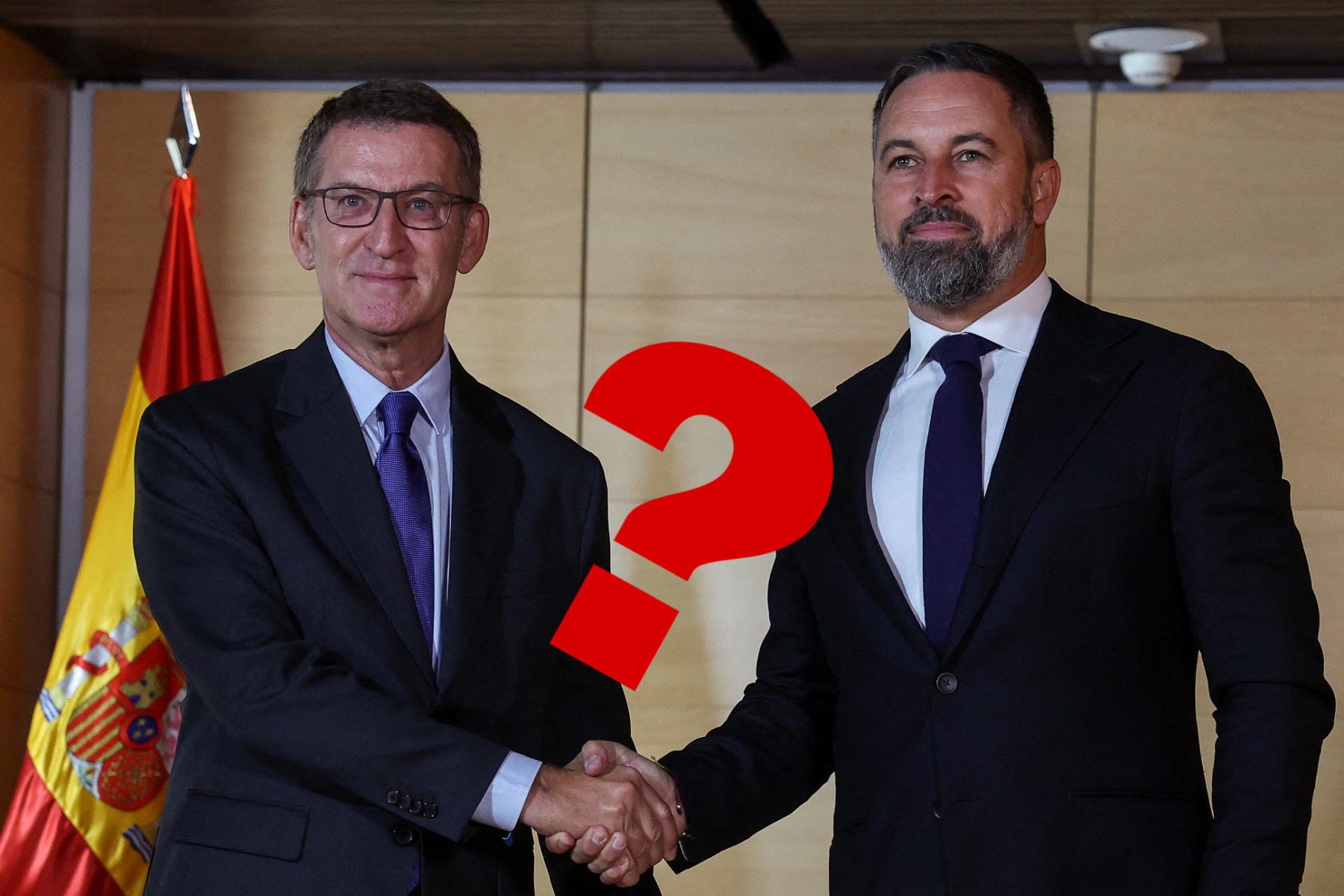
People’s Party (PP) President Alberto Núñez Feijóo (L) shakes hands with VOX party’s leader Santiago Abascal
Pierre-Philippe Marcou / AFP
In recent weeks, rumors about a new party within Spain’s conservative spectrum being in the making have intensified. Prominent political figures, mainly former members of VOX and the liberal Ciudadanos party, are reportedly exploring the possibility of presenting a new electoral option ahead of the 2027 general elections. Their goal would be to act as a ‘hinge’ between the centre-right Popular Party (PP) and the conservative VOX, facilitating their understanding and collaboration while introducing a liberal/libertarian vision to the existing political proposals.
The names emerging in this process include Iván Espinosa de los Monteros and Macarena Olona, two of VOX’s most prominent voices until their departure from the party. Rumors suggest that Marcos de Quinto (former Ciudadanos member and ex-Coca-Cola executive) and Víctor Sánchez del Real (former VOX deputy for Badajoz) could also join the initiative.
According to various sources, these figures have held private meetings in recent months to assess the project’s viability. They discussed the need to establish a new political space that represents a liberal-conservative alternative and “combats the growing political disaffection in Spanish society.”
Talking to europeanconservative.com, Fran Carrillo, CEO and political consultant at Spanish consultancy company La Fábrica de Discursos, a former deputy in the Andalusian Parliament, and former senator for Ciudadanos, asserts that “there is a large number of discontented voters who do not feel represented by the current parties.” Analyzing the Spanish reality, he believes that “political disaffection, increasing taxes without tangible improvements in quality of life, and the perception of insecurity” are some of the reasons why this new party could attract millions of citizens, especially young people. “There are four million abstentionists in Spain,” he stresses.
One of the ideological models being considered is the ‘trinity’ of Milei-Bukele-Trump, which “combines shock economic policies, a tough stance on crime, and a direct discourse against political elites.” In this sense, Carrillo believes the potential party should aim to recover “the original values of Ciudadanos” without repeating the mistakes that led to its decline.
Spain’s right-wing ecosystem is already fragmented, and any new actor risks further dividing the vote rather than strengthening it. Alvise Pérez, a media figure, activist, and Member of the European Parliament for Se Acabó la Fiesta (SALF), urged Espinosa de los Monteros in an interview on Distrito TV not to waste time on theoretical debates and to act quickly to prevent the project from losing relevance amid the political and economic crisis the country is experiencing.
Alvise Pérez stated:
The solution is not to divide the right further, which is why I call on Mr. Iván Espinosa: let’s not wait a year for a think tank; the country is going bankrupt now. Let’s not stretch that year out; and I offer him the entire SALF structure. I will step aside, and he should take the lead and run as SALF’s number one candidate in the general elections.
No podemos dividirnos más; unámonos quienes somos contrarios a Pedro Sánchez.
— Alvise Pérez (@Alvise_oficial_) February 5, 2025
Si Iván quiere sumar fuerzas, volver al Congreso y dar ya un paso al frente, le ofrezco echarme a un lado pese a que me hayan votado más de 800.000 españoles y que él sea el n°1 de SALF a las… pic.twitter.com/b0E4iJvbnd
SALF secured 800,000 votes in the previous European elections. According to sources within the Popular Party and VOX, it drew approximately 300,000 votes from each party, with an additional 200,000 coming from abstentionists.
Alvise Pérez’s remarks also confirm the widespread rumor of the imminent emergence of a new political player in Spain. He, however, has declined to comment to this outlet on the matter.
On the other hand, Espinosa de los Monteros’ increasingly frequent appearances in media outlets aligned with the Popular Party could be interpreted as an attempt by Alberto Núñez Feijóo’s party to encourage division on the right and create a chaotic scenario that would ultimately benefit the PP.
The key to the potential new party’s success would lie in its ability to offer a credible proposal that genuinely unifies the Spanish Right—something that, at present, seems highly challenging. The current fragmentation of the conservative electorate has benefited the PSOE and Pedro Sánchez. “Without an electoral system reform,” Carrillo argues, “any new actor could end up weakening the center-right bloc rather than strengthening it.”
The current electoral law, based on the d’Hondt system, allocates seats in proportional representation electoral systems that favor large parties to facilitate governance. In this context, a third party on the right could weaken the conservative bloc and make it easier for the socialists to remain in power.
The big question is whether Feijóo truly represents an alternative to Sánchez, given the PP’s explicit support for many socialist economic and ideological policies at the national level. At the same time, regional figures like Isabel Díaz Ayuso, president of the Community of Madrid, continue to represent a counterbalance within the party, distancing themselves from certain decisions made by the national leadership.
